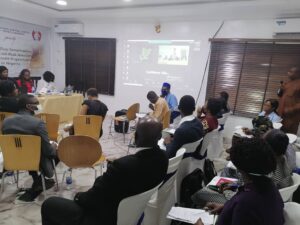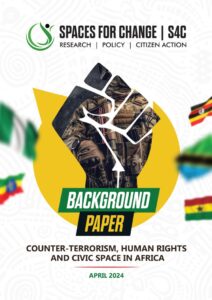The Economic and Financial Crimes Commission (EFCC), through the Special Control Unit Against Money Laundering (SCUML), in collaboration with the Technical Working Group of the NPO Risk Assessment embarked on regional consultations with NPOs, regulators and state security agencies in the six geo-political regions of Nigeria, in order to get an accurate picture of the various terrorism-financing threats in the NPO sector and also identify the NPOs that are likely to be “at risk” of terrorist financing. The delegation visited Maiduguri(North-East), Port Harcourt (South-South), Lagos (South-West), Owerri (South-East), Ilorin (North-Central) and Kaduna (North-West).
The Technical Working Group consisting of representatives of key law enforcement agencies, AML/CFT regulatory bodies and civil society orgnizations (CSOs) visited Lagos State on 8-9 February 2022 for the stakeholder consultations with key state regulators and CSOs operating in the South-West region of Nigeria. A similar consultative exercise was conducted in the South-East region on February 22-23, 2022, Issued disccused at the consultative meetings include the charitable and operational practices that open up NPOs to terrorism-financing and money laundering risks, funding sources, current risk mitigation measures in place and and the strategies for improving collaboration between regulatory bodies and NGOs in Nigeria. Top practices highlighted include difficulties in registering with and filing SCUML reports, cash handling arrangements, online (including crypto) crowdfunding systems, due diligence procedures and mechanisms for vetting donors, vendors, contractors and service providers and for delivering assistance to beneficiaries. In the South-east region where proscribed groups like the Indigenous Peoples of Biafra (IPOB) operates, conversations dwelt on the nature of charitable activities undertaken by NPOs in communities where proscribed groups operate, corporate compliance requirements, internal control measures and the challenges associated with multiple registration at the state and local levels. Across the regions, a large percentage of NPOs have faced difficulties with the SCUML registration process and with getting their registration certificates.
Previous risk assessments, particularly the 2016 national risk assessment on money laundering and terrorism financing was undertaken with minimal or no NPO sector participation. To reverse this tide, the regional consultations increased opporunities for sectoral engagement and participation in the ongoing risk assessment, thereby taking Nigeria closer to its goal of achieving a compliant rating from the Financial Action Task Force. It is further hoped that this exercise will lay the foundation for the formulation of policies that are risk-based, targeted and proportionate to the level of TF risks and threats identified within the sector.





















